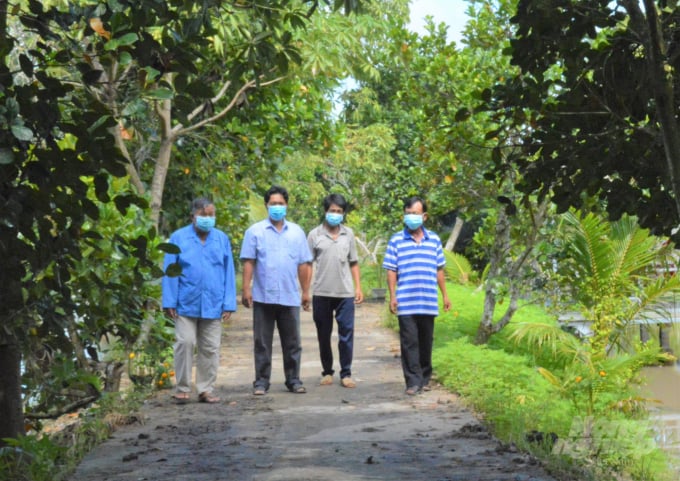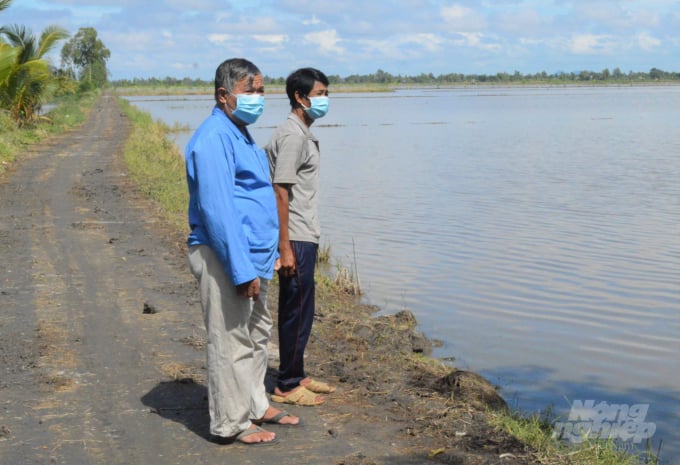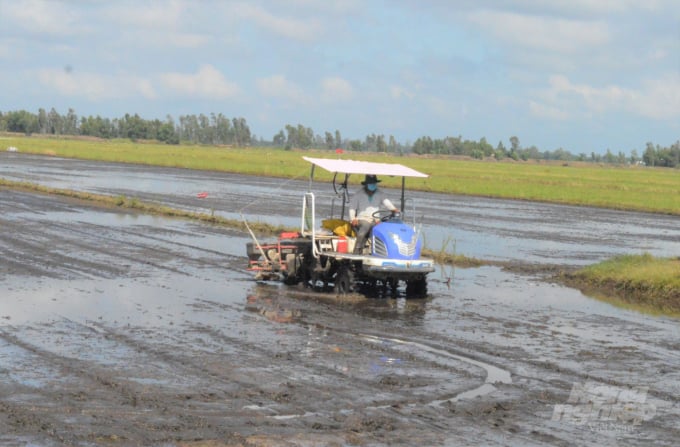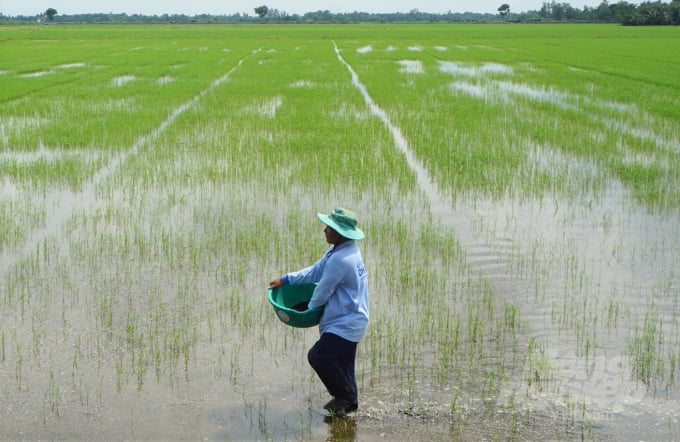May 30, 2025 | 17:37 GMT +7
May 30, 2025 | 17:37 GMT +7
Hotline: 0913.378.918
May 30, 2025 | 17:37 GMT +7
Hotline: 0913.378.918

VnSAT project in Soc Trang province has implemented activities to support infrastructure construction (connecting rice material areas), investment equipment (warehouses, dryers, transplanters, straw collectors...). Photo: Dao Trung Chanh.
Most of the arable land in Soc Trang province in the dry season is heavily affected by the annual saline intrusion. Farmers are always afraid of a lack of fresh water for rice cultivation. Therefore, using and managing water economically and still effectively in rice production is always a pressing issue.
Over the past five years, since 2015, Vietnam - Sustainable Agriculture Transformation Project (VnSAT project) in Soc Trang province has implemented activities to support infrastructure construction (connecting rice material areas), investment equipment (warehouses, dryers, transplanters, straw collectors...) and transfer of sustainable rice production techniques to farmers in the project area. In which, training farmers to apply the technical process of "3 decreases, 3 increase" and "1 must 5 decreases", help rice farmers achieve more efficiency than expected.
Mr. Truong Van Hung, Director of Hung Loi Cooperative in An Hung hamlet, Long Duc commune, Long Phu district (Soc Trang province) said, applying alternating wet-dry water management in rice cultivation according to the technique "1 must 5 reductions" has helped ensure a sure profit for farmers. In addition, the synchronous application of solutions such as reducing seeding, reducing fertilizers and pesticides also plays a critical role.

Inner-field dike roads in the VnSAT project area have been solidified, helping farmers transport materials conveniently and manage water resources more effectively. Photo: Dao Trung Chanh.
At Hung Loi Cooperative, farmers still cultivated according to old practices in the past. The number of rice sowing is high; without control, the water is pumped into the field. Therefore, when seeing the VnSAT project staff, reducing the number of seeds for sowing is recommended. At first, farmers were very skeptical. However, farmers were convinced by the equivalent rice yield, even higher than the old way.
In addition, farmers also saw benefits from the new method of sowing rice, which reduced fertilizer use. Rice plants grow well with fewer pests and diseases. The rice roots go deep into the soil by applying less nitrogen fertilizer. As a result, the rice plant is sturdy, does not fall, and is easy to harvest by machine. The amount of irrigation water for rice cultivation is also reduced from 6 times to only 3-4 times.
In the dry season, salinity penetrates the fields in Long Phu. Thanks to the VnSAT project, 53 member households of Hung Loi cooperative no longer have to worry about the lack of water for irrigation.
In Kien Giang, the VnSAT project is deployed in key districts and cities for rice production, including Tan Hiep, Chau Thanh, Giong Rieng, Hon Dat, Giang Thanh, Go Quao, U Minh Thuong, and Rach Gia.
The project aims to have 30,813 hectares, with 16,283 farmer households participating. The Kien Giang Agricultural Extension Center is the unit participating in technical training for farmers participating in the VnSAT Kien Giang project.

The amount of rice seed sown has decreased from 150-200 kilograms to 100-120 kilograms per hectare. Photo: Dao Trung Chanh.
Mr. Le Van Dung, Head of Information, Training and Cooperation Department, said that the unit has trained 409 classes, including 206 classes of "3 decrease, 3 increase", 203 classes of "1 must 5 decreases". The number of farmers participating was 42,567 people, farming area 48,583 hectares, far exceeding the set target.
Through the training, farmers see the benefits of reducing inputs in rice production. Specifically, the amount of rice seed sown has decreased from 150-200 kilograms to 100-120 kilograms per hectare. Depending on the method of sowing, if transplanting by machine, only about 60-80 kilograms of seed rice per hectare is needed.
"Spread sowing is also a premise to help farmers reduce fertilizers and reduce the number of times of spraying pesticides. As for irrigation water, due to the application of alternate wet-dry irrigation techniques in the rice crop, the average farmer participating in the VnSAT project has reduced by about 30% compared to the previous traditional farming. This reduction saves many billions of dong per crop, lowers production costs, and increases profits for farmers," Mr. Dung assessed.

When applying alternating wet-dry techniques, the amount of water is saved 25 - 30%, reducing about 1,500 m3 of water per tonne of rice. Photo: Dao Trung Chanh.
Similarly, Mr. Vo Quoc Trung, technical manager of the VnSAT project in Soc Trang province, said that Soc Trang province deployed on a rice production area of 43,000 hectares, with 29,000 member households of 31 cooperatives participating, belonging to 30 communes in 6 districts (Chau Thanh, Ke Sach, Long Phu, My Tu, My Xuyen, and Thanh Tri). Up to now, the project has benefited 75,640 people, more than 20,000 hectares have applied sustainable rice farming techniques. In addition, profit increased by over 30% compared to before.
The amount of water saved annually is equivalent to 390 million m3 of water per year. This amount of water savings is especially significant, especially in the peak months of the annual dry season in the winter-spring crop.
Applying technical progress "1 must 5 reduces", in which the impact of alternating wet-dry water management techniques has brought many meanings. The most obvious is reducing irrigation water compared to traditional farming practices and using water resources more rationally.
Specifically, the irrigation pump has been reduced 2-3 times for each crop in rice cultivation in the dry season. With the Continuous Flooding Method, the amount of water required to produce 1 ton of rice uses about 4,500 m3 - 5,000 m3. When applying alternating wet-dry techniques, the amount of water is saved 25 - 30%, reducing about 1,500 m3 of water per tonne of rice. As a result, the VnSAT project in Soc Trang province has contributed to reducing greenhouse gas emissions equivalent to 181,000 tons of carbon dioxide.
Translated by Ha Phuc

(VAN) Several scientists and farmers are experimenting with soil treatment in some key durian-growing regions such as Cai Lay (Tien Giang), Dak Song, Gia Nghia, and Dak R’lap (Dak Nong).
/2025/05/25/4127-3-073637_820.jpg)
(VAN) Thanks to the promotion from an FAO-implemented project, vegetable production in greenhouses in Moc Chau has seen strong development, from 1.5 hectares in 2021 to nearly 50 hectares in 2024.

(VAN) FAO has recently supported USD 140,000 to implement the project 'Risk mitigation human-animal interface risks through disease control initiatives in pig farming.'

(VAN) The People's Committee of Tra Vinh province has approved an adjustment to the investment policy for the Green Hydrogen Plant project, increasing its area to approximately 52.76 hectares.
![Reducing emissions from rice fields: [2] Farmers’ commitment to the soil](https://t.ex-cdn.com/nongnghiepmoitruong.vn/608w/files/news/2025/05/05/dsc08881jpg-nongnghiep-140632.jpg)
(VAN) Clean rice cultivation model in Thuong Tan commune, Bac Tan Uyen district, is assisting local residents in achieving sustainable agriculture by substantially reducing costs, increasing productivity, and protecting the environment.

(VAN) At the conference to disseminate Resolution No. 68, AgriS introduced its digital agricultural ecosystem and reaffirmed its commitment to accompanying the Government in promoting private sector development and sustainable agriculture.

(VAN) 'Blue Ocean - Blue Foods' initiative is designed to restore marine ecosystems and establish sustainable livelihoods for local communities by cultivating a minimum of 1,000 hectares of cottonii seaweed in the first three years.